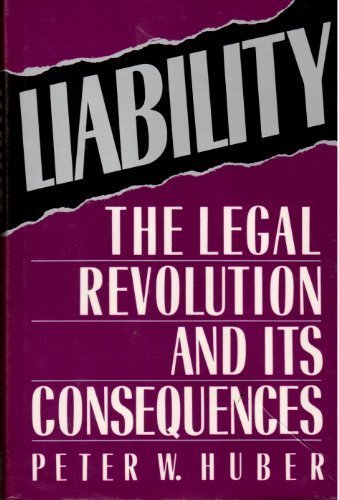Liability
Peter Huber
his controversial book describes the transformation of modern tort law since the 1960s, and shows how the dramatic increase in liability lawsuits has had an adverse effect on the safety, health, the cost of insurance, and individual rights.
American consumers pay a hidden tax on all goods and services they purchase. According to attorney Huber, this tax is the result of a major change in the law of liability during the last generation. Huber, former clerk to Supreme Court Justice Sandra Day O’Connor, maintains that restructuring liability law has actually made people less safe by discouraging the introduction of new products and, thus, inhibiting innovation. The premise of this book is that liability – the question of who is responsible for what and to what extent – has evolved from contract to tort. Under the theory of contract, liability was based on agreed-upon terms and conditions. This limited liability to what the contracting parties intended. Under tort law, the theory of a civil wrong, there is greater liability. Here, the manufacturer of a product or a provider of a service is responsible for all “reasonably foreseeable” consequences of his or her actions. What is “reasonably foreseeable” has been greatly expanded by the courts to provide for an ever-widening web of liability and an escalating spiral of damage awards. Today, it is not sufficient to include warnings and instructions on a product. Manufacturers have been held to be negligent for failing to foresee that instructions and warnings might not be followed. Drug manufacturers may be hesistant to market new vaccines that might save thousands of lives for fear of liability for a statistically insignificant number of adverse reactions. Huber’s is a polemical treatise with little balance. His arguments place him within the “law and economics” school, a conservative doctrine that argues that one purpose of law is to ensure economic efficiency and maximum output at minimum cost. But Huber has little to say about the victim, only about the companies that must pay higher insurance premiums or perfect their products before marketing them. His is a strong defense of a particular position that addresses only one side of an important legal and economic issue. (Kirkus Reviews) (Booktopia)








Reviews
There are no reviews yet.